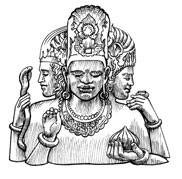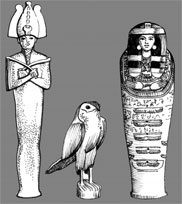The Twin Sins
Next Part The Unknown God
Back to The Trinity
Back to By David C. Pack
The entire chapter of Leviticus 26:1-46 outlines what God expected of Israel from the very beginning. Early in the chapter, He describes a long list of promises that He would fulfil if she obeyed, but includes an even longer list of punishments that would come upon Israel if she did not keep her part of the bargain. The first three verses of the chapter set the stage and reveal what God considered to be the two greatest “twin sins” that would set in motion the punishment to follow—idolatry and Sabbath-breaking. This warning brings special emphasis from God’s mind to avoiding idolatry at all costs and to always remember the Sabbath Day that points to the God of Creation!
Let’s read these verses: “You shall make you no idols nor graven image, neither rear you up a standing image, neither shall you set up any image of stone in your land, to bow down unto it: for I am the Lord your God. You shall keep My sabbaths, and reverence My sanctuary: I am the Lord. If you walk in My statutes, and keep My commandments, and do them…”
God knew that if His people committed either of these great offences, they would lose contact with Him—and every evil, curse and bad effect would result. But commission of these offences also explains why the entire world is in such confusion, and is plagued by every problem, evil and ill known to man.
Though it is not the subject of this volume, Almighty God will soon intervene in the affairs of all nations. The time of final punishment of the modern nations descended from Israel, which will then involve the final captivity for disobedience, is soon to occur. (You are urged to read our thorough book America and Britain in Prophecy to grasp the bigger picture of who these nations are and all that is at stake for them.)
Worldwide Confusion—Gods and More Gods
The world is filled with gods of every sort. It is as though mankind has reserved the very best of its creative powers for the invention of every conceivable type of god and goddess—whether composed of physical matter or defined by ethereal concepts in the mind. The world’s billions worship literally millions of gods.

Trimutri, a Hindu triad of deities
The apostle Paul expresses it best as he introduces the true God of the Bible: “For though there be that are called gods, whether in heaven or in earth (as there be gods many, and lords many), but to us there is but one God, the Father, of whom are all things, and we in Him; and one Lord Jesus Christ, by whom are all things, and we by Him. Howbeit there is not in every man that knowledge…” (I Cor. 8:5-7). (How interesting that Paul references “the Father” and “Jesus Christ,” thus differentiating them from all other “gods” and “lords,” but, missing the perfect opportunity, fails to mention the Holy Spirit, the supposed third member of the trinity. This kind of omission will be explored later in an inset.)
The Romans worshipped and built temples to an almost endless array of gods and goddesses. But it is said that the ancient Greeks worshipped as many as 30,000 gods. Not to be outdone, the Hindus of today are said to have 5 million, including their own trinity consisting of Sheva, Brahma and Vishnu! Of course, the Egyptians, as did other civilizations, also had their own brand of a trinity—Osiris, Horus and Isis.
Then there is Tao, Confucius, Buddha, Allah and a host of other gods, goddesses and idols, worshipped today, including totem poles, nature, snakes, animals and fish in the sea, volcanoes and mountains, fire, wind, rocks, sun, moon, planets, stars and even certain human beings who are considered to be divine. Again, then, there are all the different kinds of metaphysical concepts of gods adored and worshipped in the mind—some of which have been depicted by physical symbols and representations rendered by artists. This describes the trinity.
Yet, and most are probably not aware of this, vastly more people believe in the three-in-one god of modern Christianity than any other form of god.


